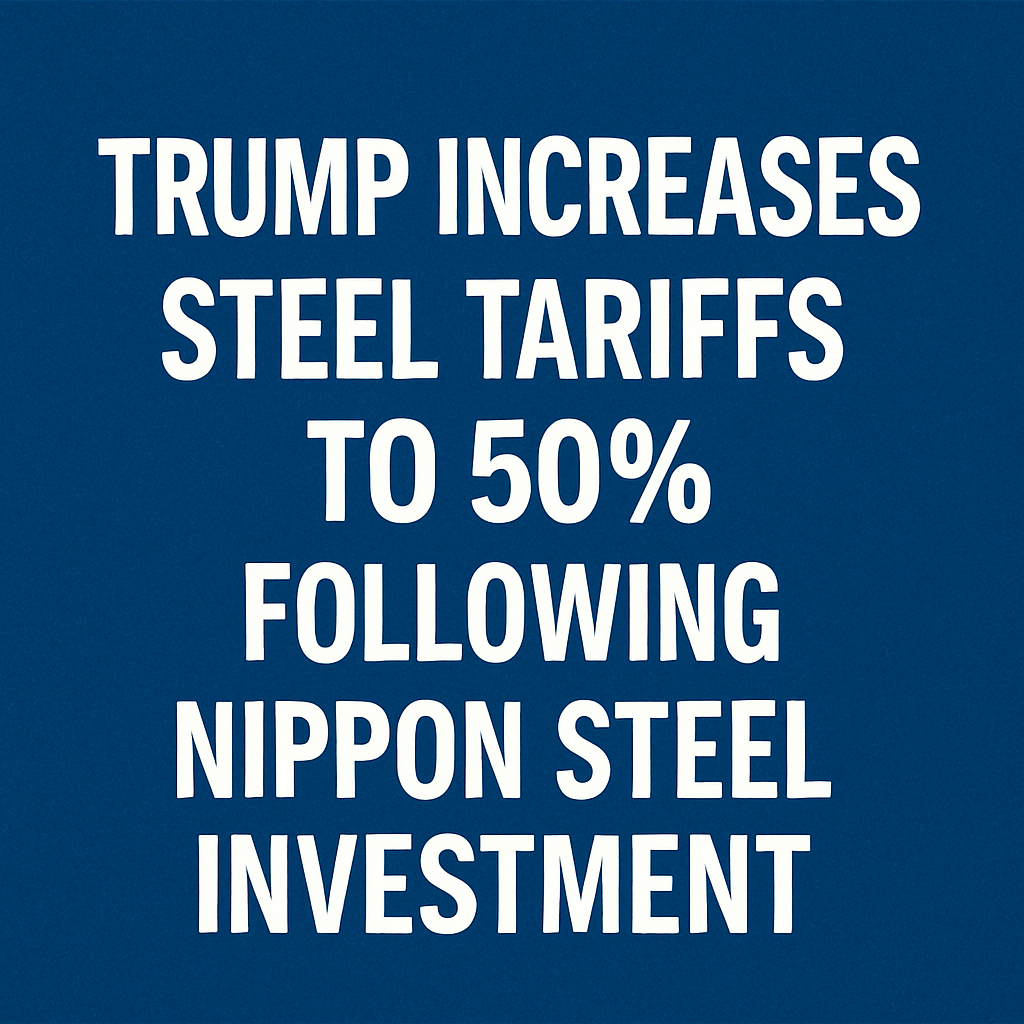Trump Increases Steel Tariffs to 50% Following Nippon Steel Investment

On Friday, during a visit to U.S. Steel’s Mon Valley Works–Irvin Plant in West Mifflin, Pennsylvania, President Donald Trump announced a significant increase in tariffs on imported steel, raising the rate from 25% to 50%. This unprecedented move aims to bolster the domestic steel industry but could also have widespread implications for various sectors reliant on steel, including housing and automotive manufacturing.
Background on Steel Tariffs
Since the imposition of steel tariffs in 2018, prices for steel products have surged approximately 16%, based on the U.S. government’s Producer Price Index. The recent doubling of tariffs is perceived as a strategic maneuver to further protect American steel manufacturers from foreign competition, particularly from countries like China and Japan, known for producing steel at lower costs due to government subsidies and weaker environmental regulations.
Details of the Nippon Steel Investment
During his speech at the Irvin Plant, Trump highlighted a pivotal agreement involving Japan’s Nippon Steel, stating that this arrangement would guarantee that U.S. Steel remains an American-owned entity. Though specifics of the deal remain under wraps, reports indicate that Nippon Steel is poised to invest upwards of $14 billion into U.S. Steel facilities across several states, including Pennsylvania, Indiana, Alabama, Arkansas, and Minnesota.
Despite previously opposing any potential foreign ownership of U.S. Steel, Trump’s administration facilitated what he referred to as a “partial ownership” structure that would allow Nippon Steel to invest capital while maintaining American control over operational and strategic decision-making. This arrangement reportedly features a “golden share” structure that would enable the U.S. government to exercise veto power over critical business decisions.
The Political Landscape and Implications
The announcement comes in the heels of a political landscape in which manufacturing jobs remain a key concern for many voters. By promoting domestic production and ensuring U.S. ownership, Trump seeks to resonate with blue-collar workers who perceive steel industry health as paramount to their livelihoods. The fate of U.S. Steel is especially crucial in battleground states like Pennsylvania, which could influence outcomes in the upcoming midterm elections.
Concerns from Labor Unions and Local Workers
While some unionized steelworkers view the investment positively, with hopes for upgrades to aging facilities, skepticism persists regarding the actual control U.S. Steel will maintain under Nippon’s influence. The United Steelworkers union has expressed doubts, asserting that Nippon’s past statements indicated it would only invest in U.S. Steel if it secured full ownership. This leaves many workers concerned about future job security and operational changes at the Pittsburgh-area plants.
Workers like Clifford Hammonds have articulated a desire for investment to modernize facilities and improve operational efficiency. He remarked, “It’s putting money back into the plant to help rebuild it because this plant is old, and it’s falling apart.”
Market Reactions and Economic Impact
The broader economic implications of doubling the steel tariffs could lead to increased costs for a variety of consumer goods. Industries that rely heavily on steel, such as automotive and construction, may be forced to raise prices, which could lead to inflationary pressures across the economy. Economists warn that while tariffs aim to protect domestic industries, they can also lead to retaliation from other nations, thus potentially inciting trade wars.
Expert Opinions
Market analysts and industry experts remain divided on the potential efficacy of such drastic measures. Some argue that protecting local jobs in the short term may lead to long-term consequences as global supply chains adapt to increased costs. Barry Naughton, a trade policy expert at the University of California, San Diego, suggests that “While these tariffs may provide immediate relief to local producers, they also risk alienating global partners and increasing the cost of inputs for manufacturers in the U.S.”
Future Outlook
As the details surrounding the Nippon Steel investment continue to unfold, the political and economic landscapes will likely keep evolving. Local and state officials, including Pennsylvania Senator David McCormick and Governor Josh Shapiro, express cautious optimism towards the plan, citing the potential for job preservation and industry growth. However, concrete action and transparent communication from the involved parties are essential for building trust among the workforce and industry stakeholders.
“We have to ensure that U.S. Steel remains a pillar of American manufacturing. Doubled tariffs and foreign investment must harmonize to achieve that,” concluded McCormick.